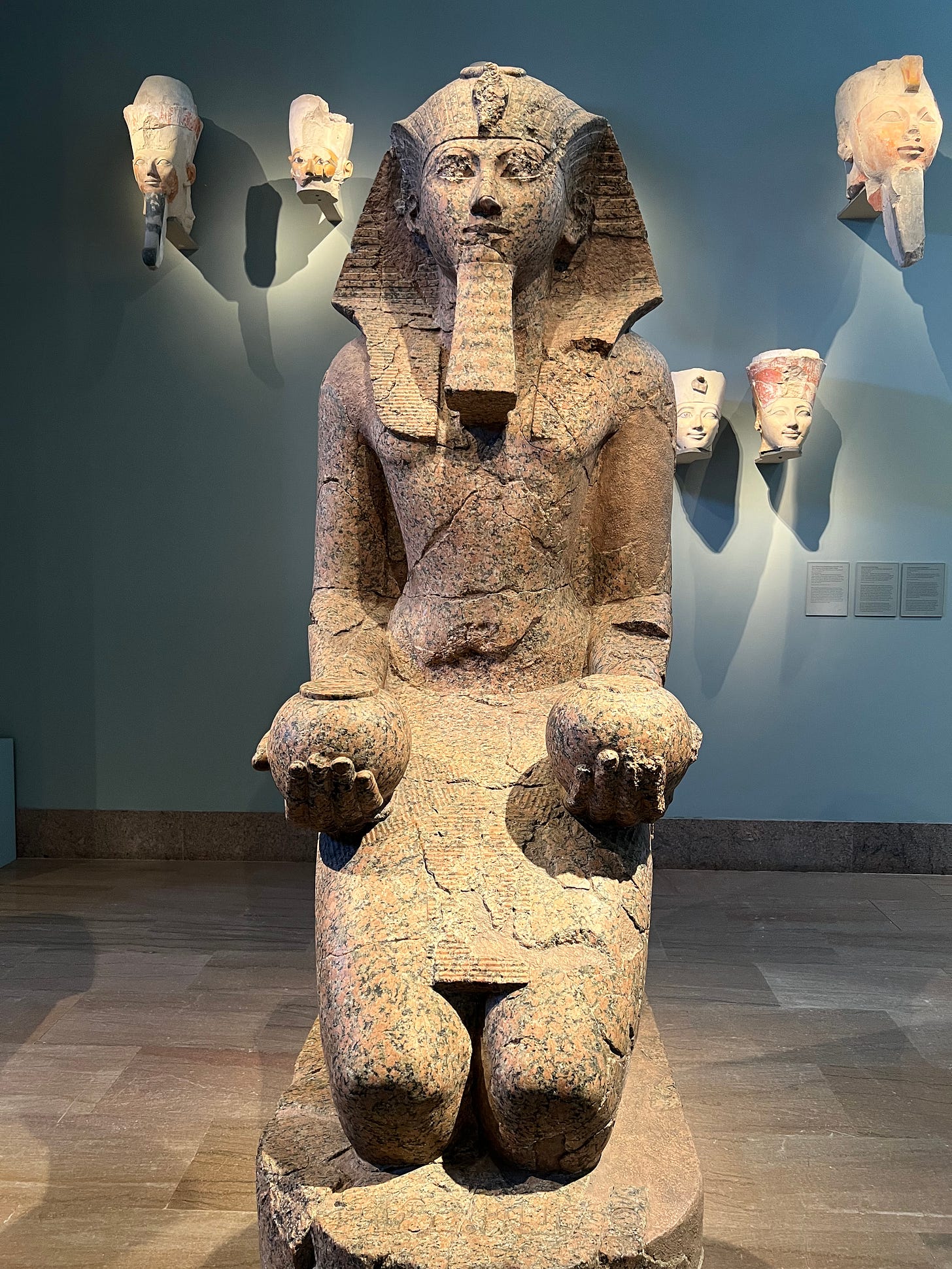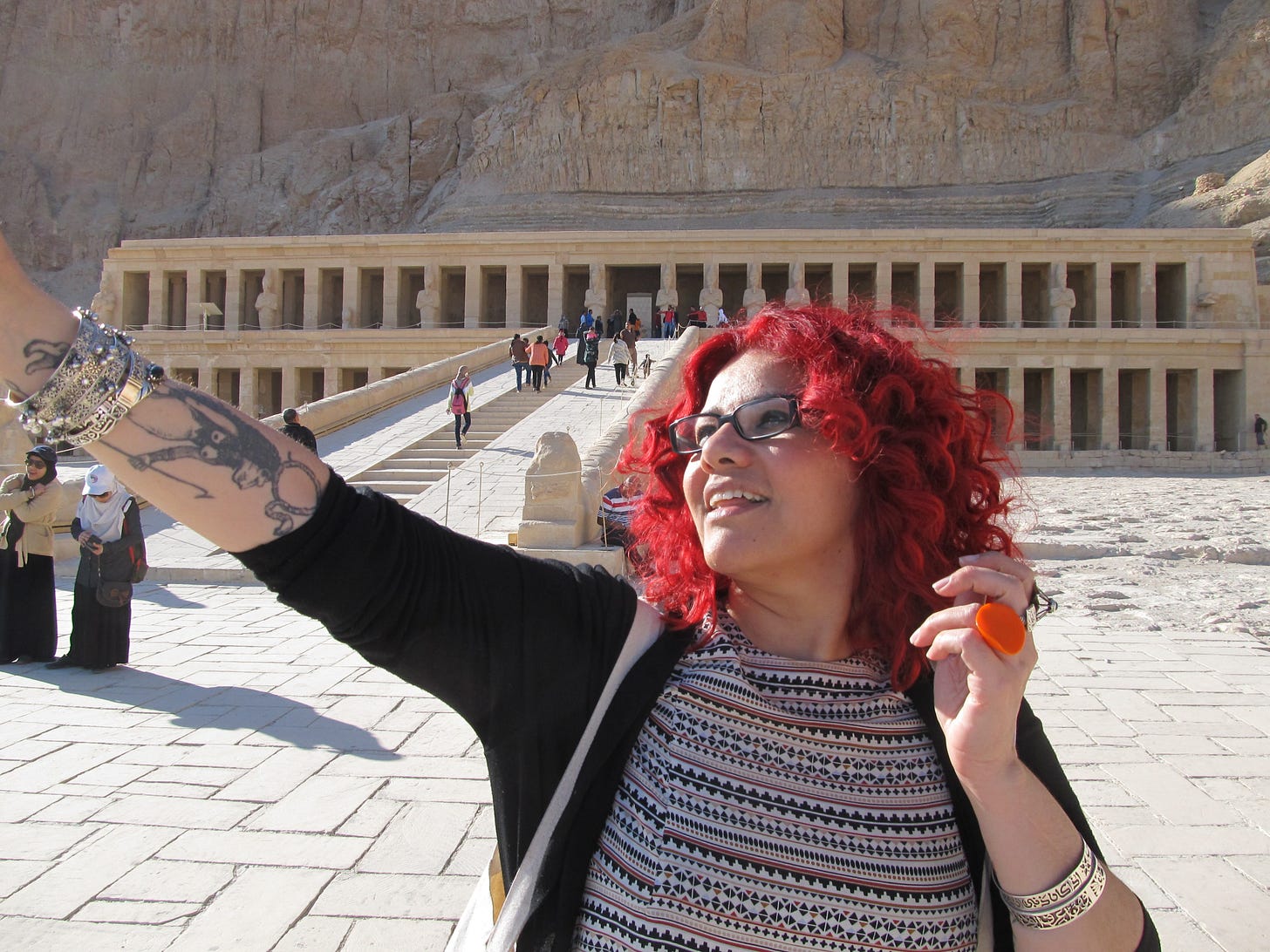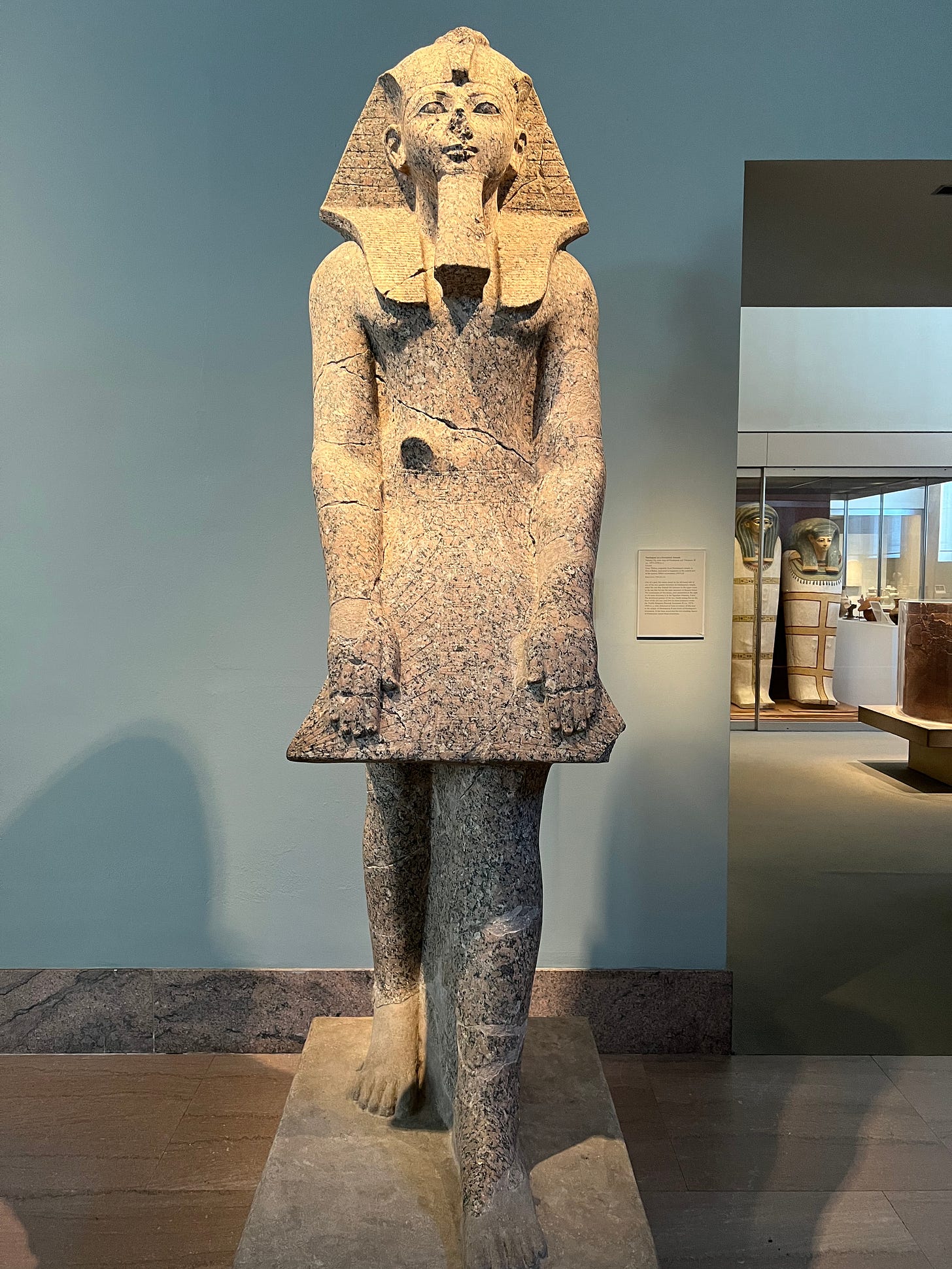Photo: Robert E. Rutledge
Dear Hatshepsut
People got out my way today.
I saw them, deliberately making room for me. Some stepped as far away from me as possible. And I fucking loved it. They seemed to be scared of me, and I fucking loved it.
So often, walking outside is an exercise of navigating a river of people, mostly men, who seem to be coming right at me. I am determined and refuse to get out of their way because I know they don’t take seriously women and our right to public space, especially Black and women of colour’s rights.
What changed? Why were people, including men, getting out of my way today?
Because of my hair. I’ve just buzzed my hair. And what’s left of it is mostly white. I am old and unfeminine.
Is that why you started wearing a beard and male regalia in your public imagery? Did you recognise that a more masculine appearance would keep people out of your way?
I never wanted to be a man, Hatshepsut. Granted, I never fully signed up for the womanhood contract but a woman I am. And then menopause made me unreliable.
Old, unfeminine, unreliable.
A stone statue of Pharoah Hatshepsut at the Met Museum. Photo by me.
Did you worry about being called “buff?” I see your pecs in the gallery dedicated to you at the Metropolitan Museum in New York City and wow. I’ve been lifting for almost three years now and while I can deadlift and squat more than my body weight, that fact is not showing in my pecs. .
I never wanted to be a man. And yet there was that man who told his friend in a voice loud enough for me to hear when I was 13 and had stubbornly short hair “That girl used to be a boy and they gave her a sex change.”
And there was the teacher at my high school who after a friend and I dressed as men, complete with drawn on beards, and disrupted the school assembly that I made a better looking man than the teenage girl I was.
And there were the boys and girls when I was seven asking “Are you a boy or a girl?” What were they looking for that they didn't see?
What did you want people to see in you, Hatesepsut, that wasn’t obvious?
And now that 7-year old looks back at me in the mirror. “I’m still here,” she insists to my reflection, with her once again stubbornly short hair.
I’m reading menopause novels and they’re all centered around almost exclusively affluent, white women who are married with children. I feel outside of that world in a way I chose and which reminds me why.
What about those of us without daughters? Those of us who will not live on through those daughters, who will not be both singed with an envy that we are socialized into for youth and at the same time taste immortality on that burnt tongue of our subconscious as we watch our daughters grow?
What does menopause do to us when we are not those things? When we are not envying our daughters’ growing fecundity as ours is drying up?
You’d think only white, married mothers went through menopause.
I’ve been to your magnificent temple in Luxor, Hatshepsut; so different from the others, so far and so high. Did you build it so far from anything to be away from everyone? That’s what I wanted when menopause really fucked me up.
Photo: Robert E. Rutledge
To hibernate, basically.
A place of my own, not to write, but to gnash and writhe and howl and stomp. And emerge magnificent.
My mother has been ill and growing increasingly frail. Many women my age describe menopause as the in-between: between increasingly frail mothers–what is to come–and increasingly fertile daughters–what once was.
What about those of us without daughters? Those of us who will not live on through those daughters, who will not be both singed with an envy that we are socialized into for youth and at the same time taste immortality on that burnt tongue of our subconscious as we watch our daughters grow?
My branch of the family tree ends with me. Can I taste the fruit of a branch that has not blossomed according to patriarchy?
It’s as if I am propelled along that female conveyer belt with no newer model following me, reassuring me that I will continue through her after I have reached the end.
A psychiatrist I saw once told me I’d lived enough for two or three lives, and that was at the age of 30. You understand that, Hatshepsut. I know. It’s what gets me called “arrogant.”
I wrote much of this in what I call a Fever of Covid Creativity. Covid caught up with me, five years on. There were moments during lockdown when I was convinced that I had it but it was perimenopause. And when it caught up with me, I learned that the menopause hormone therapy I take could possibly protect me from long Covid.
Ever since I turned 50, my body and I began a conversation I long refused. The usual word for it is embodiment. Our bodies, for those of us assigned female at birth, are always viewed in relation to men, our worth defined by patriarchy.
Menopause rendered that conversation moot.
I spent so many years deliberately ignoring the diktats of patriarchy that now that patriarchy doesn’t want to talk to me anymore, I am fucking relieved. Finally!
With patriarchy out of the way, my body and I could talk. Finally!
I never wanted to be a man, Hatshepsut. I am an arrogant woman. I refuse to be erased. I know you have thoughts on that. Your face on your statues in your temple was erased by the scared, misogynist fucks who came after you.
When I moved to the U.S. this summer 25 years ago, I shared my memoir writing with a writing group I joined in Seattle, another member of the group suggested I turn it into fiction because no one would believe it was true.
I realised then that so many white people in the U.S. led such uneventful lives that lives lived large scared them.
That’s why most television shows that centre women here rely on a mediocre and unthreatening white woman, like Carrie Bradshaw and Meredith Grey. So that their mediocre audience identify and are not threatened. The women with large, interesting lives are relegated to the side.
Those same mediocre, white women are the ones who complain of becoming “invisible” as they enter midlife. Invisible to who? Who are you calling “invisible?” People got out of my way today, Hatshepsut.
A psychiatrist I saw once told me I’d lived enough for two or three lives, and that was at the age of 30.
You understand that, Hatshepsut. I know. It’s what gets me called “arrogant.”
I never wanted to be a man, Hatshepsut. I am an arrogant woman. I refuse to be erased. I know you have thoughts on that. Your face on your statues in your temple was erased by the scared, misogynist fucks who came after you.
I never wanted to be a man, I was always arrogant in my womanhood. I always liked men who looked like women and women who looked like men. You understand that, I know, because when I walk through your gallery at the Met, I don’t know where feminine ends and where masculine begins. Does it matter?
Pharoah Hatshepsut at the Met
Why are you at the Met anyway?
I mean, I am glad that I can just get on a bus from my home in Harlem and come and see you, or take a long walk through Central Park and come to visit you. But why are you in New York City? Why am I here? Why are you in a building full of the stolen treasures of our people? Shouldn’t we both be nearer to our home, along the Nile?
Killmonger was onto something.
Did you know that I can’t even take a picture of Nefertiti at the museum in Berlin? Two guards “protect” her from visitors – including me – her fellow Egyptian.
I digress.
Or do I? This is, after all, about feeling at home in your bodies. I will take you home, I always tell you.
But did you do what you wanted with your life? I feel like I have walked away from so many things that could’ve made me great in conventional ways so that I could become great in my own way.
There’s something I’ve long wanted to ask you. It’s weird to ask you about ambition because you were the most powerful person in the ancient world for 20 years. But did you do what you wanted with your life? I feel like I have walked away from so many things that could’ve made me great in conventional ways so that I could become great in my own way.
A cisgender lesbian showed her breasts in a restroom a few days ago because she was being harassed by transphobes for using a women’s toilet and not “looking like a woman.” There are so many instances of violence against cis women who “don’t look like a woman.” The right wing in the U.S. obsesses over “What is a woman?” when the question instead should be “Why does it matter?”
Your muddying of gender presentation is a gift, Hatshepsut.
Am I no longer a woman because I don’t bleed once a month?
Is my friend who had a double mastectomy because of cancer no longer a woman?
When my mother, who has three children, had a hysterectomy did it render her no longer a woman?
I am childfree by choice, am I not a woman?
I never wanted to be a man, Hatshepsut.
When I buzzed my hair the first time, Google photos put my picture next to one of my father’s and asked “Is this the same person?”
I never wanted to be a man but menopause made me an unreliable woman. To be honest though, I’ve always been an unreliable woman. I never fulfilled whatever it was I was supposed to fulfill to be a reliable one. And then the menopause transition took my unreliability and crowned it with power. And your transition from a Queen to a Pharoah–the King Herself–offered me a path–a gift–twoards making the unreliable magnificent.
How I could be she/he/they and rule my world.
How to unbecome.
Alchemising unreliability to unbecome and be who I knew I was waiting for.
I might never have given birth but I have been pregnant with all the iterations of who I had to unbecome, to give birth to who I knew I could be if I let go.
You know the saying “If I wasn’t Egyptian, I would wish to be Egyptian?”
Seriously, who wouldn’t want to be Egyptian? What a glorious heritage we have. What confidence it inspires in us as we walk through the world. I’m interested in how that confidence lives in a woman. Even one who increasingly employed the trappings of masculinity to consolidate her power. And injected femininity in those who came before her to further muddy gender in furtherance of her power.
I never wanted to be a man, Hatshepsut. My mother raised us to never think men were more intelligent. If anything, she infused my sister and me with a healthy skepticism of men’s intelligence.
Yes, you describe yourself as “daughter of” rather than “son of” when you emphasised your connection to the divine power of your time to seal your claim to power, but you did it with an assuredness we have been socialised to associate with a man.
People got out of my way today, Hatshepsut. And I fucking loved it.
—You can support my work via a one-time payment through PayPal or Buy Me a Coffee
—You can also support my work via Patreon
Mona Eltahawy is a feminist author, commentator and disruptor of patriarchy. Her new book, an anthology on menopause called Bloody Hell!: Adventures in Menopause from Around the World was published this year. Her first book Headscarves and Hymens: Why the Middle East Needs a Sexual Revolution (2015) targeted patriarchy in the Middle East and North Africa and her second The Seven Necessary Sins For Women and Girls (2019) took her disruption worldwide. It is now available in Ireland and the UK. Her commentary has appeared in media around the world and she makes video essays and writes a newsletter as FEMINIST GIANT. She is working on her fourth book, The King Herself: How Hatshepsut Helped Me Unbecome.
I appreciate your support. If you like this piece and you want to further support my writing, you can like/comment below, forward this article to others, or send a gift subscription to someone else today.





